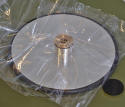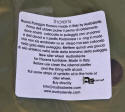-edible zone-
--Review period: February 2017 to November 2017
--Price: $48.00
The wheel is nicely machined in aluminum. Bushing is bronze. Comes with instructions and three spare O-rings. As delivered, on the wheel is the black rubber O-ring. In the bag are two red O-rings and one other black. The shiny red one is silicone, the others are rubber. Presently I'm listening to the black rubber that was on the wheel as received.
--
 Left: Two Photos. The Thorens idler wheel then the Audiosilente
O-ring wheel.
Left: Two Photos. The Thorens idler wheel then the Audiosilente
O-ring wheel.
--
 The Audiosilente wheel out of the wrapper.
The Audiosilente wheel out of the wrapper.
-- Left: Looking at the exposed TD124 chassis with platters off and
directly at the idler wheel axle shaft, thrust washer and phenolic
spacer washer beneath. The phenolic spacers are added / subtracted
to adjust wheel height relative to the stepped pulley that drives it.
Left: Looking at the exposed TD124 chassis with platters off and
directly at the idler wheel axle shaft, thrust washer and phenolic
spacer washer beneath. The phenolic spacers are added / subtracted
to adjust wheel height relative to the stepped pulley that drives it.
--Link to .mov file -- Quicktime movie of the wheel under power
Early notes:
- Fit and finish appear excellent.
- There was a need to adjust wheel height by using a different combination of phenolic spacers beneath the thrust washer.
- Visually, the wheel appears to spin true in all axes. The O-ring appears to be well seated within the wheel and spinning true.
- SQ: most prominent difference: bass seems better defined and also more prominent. Good sense of visceral thrust. No loss of detail in the other sound frequencies.
Notes: 11/18/2017
To avoid reader confusion let me define some terms:
- diameter. all rings supplied have the same diameter so that they may fit over the same aluminum wheel
- cross sectional thickness (which is also correctly described as a diameter of the cross-section)
- materials: Red rubber, red silicone, black rubber, black silicone
I see two different cross sectional thickness' in the supplied kit of
rings. The fat ones have a thickness of Ø3.5mm. * The thin ones are
Ø2.5mm. The thin rings when fitted to the wheel will cause a smaller
outside diameter at the rim than the thicker rings. Because this is an
idler wheel, different diameters at this part does not affect platter
speed which is controlled by motor rpm, pulley diameters and the inside
driven rim diameter at the platter.
footnote: the symbol Ø
is GD&T for 'diameter' and is used in drafting documents commonly seen
in Aerospace manufacturing
At present I'm using the 'fatter' red
silicone O-ring....and have been since May this year. With the red ring
I can confirm my earlier listening observations made while using the
'fat black' O-ring. Speed from a cold start comes up to the mark on the
strobe within the first revolution. This was the case with the
previously worn Thorens idler. And it reflects on how well my motor and
drive train refurbishments were carried out. However, now with the the
AudioSilente idler wheel, I have an apparent better sense of constant
speed. While this might have been achieved with other idler wheels,
including new wheels available from Schopper in Switzerland, speed seems
as consistently steady as I've ever heard on a TD124 in my listening
room.
About the noise floor and the new idler wheel. I have not
made any recordings so that I might use software to present Signal to
Noise Ratio charts as evidence of my listening observations. I thought
it inappropriate since the previous idler wheel used on this particular
player was worn and showing evidence of age (small crack lines in the
rubber) and hardening of the rubber. So these observations are based on
my senses of hearing and sight. That much said, the test deck, sn 13943
is a mk1 with mk1 configuration motor mounting grommets. Initially I
tried this wheel on the deck while the deck was equipped with new but
standard rubber motor grommets. Then I changed from using the rubber
grommets to using some silicone grommets from Geltec in Japan. With the
Geltec grommets the deck ran quite obviously quieter than with rubber.
All the while using the Audiosilente idler wheel. So....with this idler
wheel and with the Geltec grommets in the deck while situated in a heavy
slate plinth, the drive train noise is quite low and acceptable to me.
Perhaps an upgrade to the mkII grommet kit would improve drive train
noise to even lower levels. As it is, I'm happy.
With regard to
making listening comparisons between the black rubber o-ring and the red
silicone o-ring I can't say that there are any overt easily recognizable
differences heard between the two. Other words, listening is very good
with either one. Try them all, you decide. I'm happy with the fat rings.
The smaller Ø2.5mm o-ring seems a but slim on cushion against the
driving stepped pulley for my squinty, skeptical eyes. That said I have
yet to try the skinny rings but I might later. You try them, you decide.
With regard to the machined wheel I can say that the idler wheel
runs very true for concentricity and also true in terms of any apparent
vertical run-out. The video I produced earlier this year will serve as
evidence of that. The machining on this wheel is 'top tier' for accuracy
of form, fit and function. And the cosmetics are also top tier. A classy
product.
Link to movie
file of the wheel in action. (.mov file -- Quicktime movie)
With this wheel I get; excellent bass, momentum and musical details high
and low. After changing motor grommets from rubber to silicone, drive
train noise was reduced to expected levels.
https://www.audiosilente.com/
Note: the Audiosilente website is in Italian language. (speaks
fluent english)
Simone's email: simoluc@tiscali.it
also:
info@audiosilente.com
-Steve Clarke




